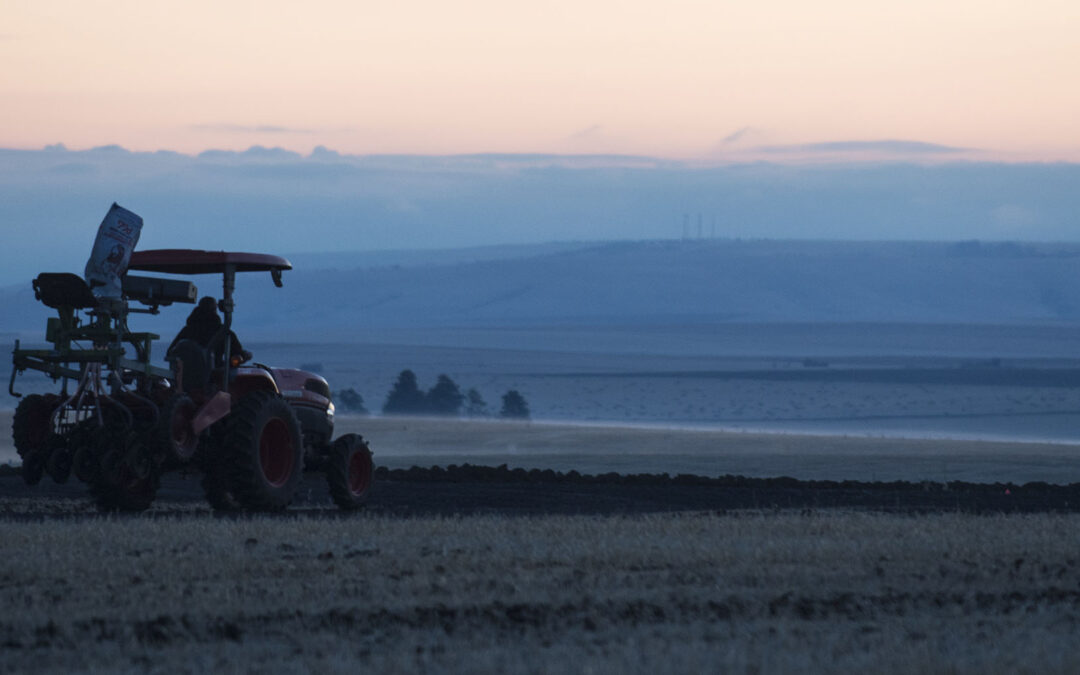(Pictured above: An employee drives the research planter to the wheat research plots before sunrise at the OSU Columbia Basin Agricultural Research Center near Pendleton. Credited to Lynn Ketchum, OSU)
Sponsored content contributed by AOC Business Partner: OSU Extension Services
Farmers and ranchers face overwhelming stress from market fluctuations, crop failures, unpredictable weather, injuries and other setbacks, leading to depression and, too often, suicide. According to the Centers for Disease Control and Prevention, male loggers and commercial fishers’ risk of suicide are among the highest among all occupations: nearly five times the rate of the general male population — 114 and 112 per 100,000, respectively.
Male farmers die by suicide at twice the rate of the general population, with 48 per 100,000 people. This alarming trend has been rising in recent years, particularly among rural men over 49, who are considered a high-risk group. Suicide data by occupation reveal that loggers, commercial fishers, farmers and ranchers are among those with the highest risk.
To address this crisis, the AgriStress Helpline launched in Oregon in September 2023. Available 24/7 by call or text at 833-897-2474, the helpline is staffed by certified suicide preventionists with additional training in issues specific to Oregon’s agriculture and natural resource communities. The Oregon Legislature passed Senate Bill 955 in 2023, providing a one-time general fund appropriation to establish an endowment for Oregon State University Extension Service to implement and operate the helpline in its first year. A coalition of 27 agriculture, timber, and health care organizations advocated for the passage of SB 955.
Allison Myers, associate dean in OSU’s College of Health, and Todd Nash, a Wallowa County rancher and past president of the Oregon Cattlemen’s Association, were instrumental in building support for the helpline. Oregon is the first state to operate the AgriStress Helpline in partnership with an Extension service.
As of September 2024, the helpline had provided support and referrals, including crisis interventions, for callers from 21 counties. While call details remain confidential, available data show that the helpline is effectively reaching its intended audience, with callers expressing a preference for a service tailored specifically to their needs.
This helpline is one of several OSU Extension programs and initiatives collaborating with farmers, families and communities to implement evidence-based strategies that promote mental health and reduce substance use in rural Oregon.
The Farm and Ranch Stress Assistance Network — an OSU Extension program that launched in 2021 — uses QPR (Question, Persuade, Refer) to teach farmers, ranchers, and their family and friends how to recognize signs of a mental health emergency and interrupt the process that leads to suicide.
The network website includes a list of the signs and symptoms of stress and suicide, such as withdrawal from others, giving away precious possessions, depression, drug or alcohol abuse, or decline in the care of livestock, farmstead appearance and personal care.
To train people to be a positive force, OSU Extension offers QPR trainings, many of which are on Zoom. Participants learn to recognize the signs of suicide and question someone in crisis, persuade them to seek help, and refer them to a hospital, counselor, or other resources to get the help they need.
OSU Extension through QPR has trained more than 450 people in how to recognize signs of distress and intervene in mental health emergencies. In post-course surveys, 67% of participants indicated an increase in knowledge of warning signs of suicide, and 83% reported an increased understanding of suicide prevention facts, risk factors, and how to ask someone about suicide.
Additionally, 67% reported an increased understanding of how to persuade someone to get help, and 83% said they would likely ask someone about suicide if they saw warning signs and were concerned.
OSU is part of four regional Farm and Ranch Stress Assistance Network entities across the United States funded by the U.S. Department of Agriculture National Institute of Food and Agriculture.
The Coast to Forest collaboration between the OSU Extension Family and Community Health Program and the OSU Center for Health Innovation works on mental health promotion and substance use prevention.
Coast to Forest goals include:
- Improving mental health and well-being
- Expanding training tools and technical assistance through the OSU Extension Service and the OSU College of Health
- Building capacity in rural Oregon to prevent and reduce opioid and stimulant use disorders and their consequences and move people to recovery
The Coast to Forest initiative builds upon existing state and community strengths and resources. This includes a growing network of community health workers, radio stations covering communities’ health and wellness, community level partnerships and an expanding Mental Health First Aid network.
OSU Extension is committed to enhancing mental health support for rural communities, addressing the unique stressors faced by farmers, ranchers and natural resource workers. Through initiatives like the AgriStress Helpline and training programs, OSU Extension provides critical resources to prevent suicide, promote mental well-being and reduce substance use.
Story sources: Allison Myers, Julie Leep, Cassie Bouska — Oregon State University Extension Service
Read this article online: https://beav.es/Gux

